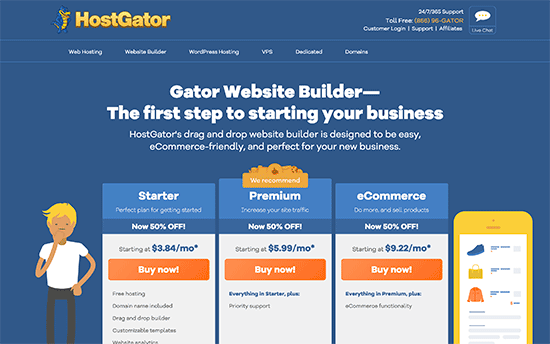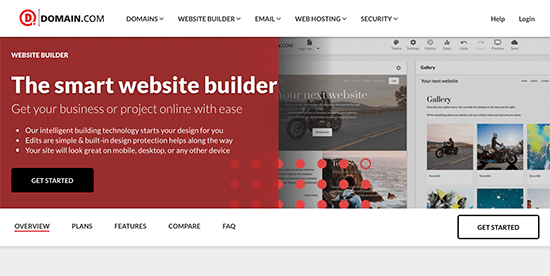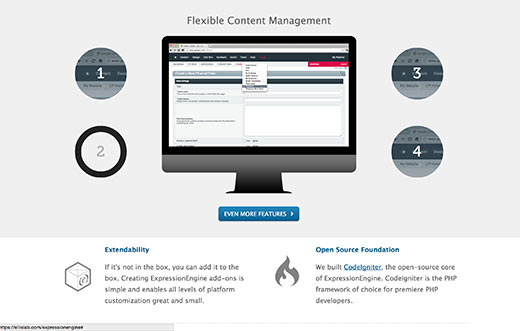WordPress is popular, and we love it, but it is not the only publishing platform. There are WordPress alternatives that you can use to build your website.
Each of these WordPress competitors is different and has its own pros and cons. You need to understand those differences and limitations when choosing a WordPress alternative.
In this article, we will show you some of the most popular alternatives to WordPress currently available on the market.

Why Do People Look for WordPress Alternatives?
WordPress powers over 43% of all websites, and it is the most popular website builder in the world.
There are a lot of reasons why people choose WordPress: free, customizable, SEO friendly, blogging tools, social media tools, advanced features, eCommerce ready, multilingual language support, thousands of free web design templates, and more. See all the reasons why people use WordPress.
Since 2003, the WordPress open-source platform has come a long way when it comes to ease of use, with many drag-and-drop website-building tools like SeedProd, Divi, and Beaver Builder that let you create custom websites from scratch without writing any code.

Oftentimes, business owners prefer using WordPress because it’s the best solution that helps you rank higher in search engines.
If you want to make a WordPress site with an affordable pricing plan, then you can get started with Bluehost.
→ Start Your WordPress Site Today (Special Offer) ←
But while WordPress is popular, it is not a good fit for everyone.
That’s because some business owners don’t want the hassle of managing their own website backups, security, and updates.
If you’re looking for the best WordPress alternatives, then you’re in the right place.
We have tried just about every WordPress alternative in the market, and here are the top WordPress competitors.
1. Web.com

Web.com is an affordable website builder and a very popular WordPress alternative among small business owners.
Their plan starts at $1.95 per month and comes with a free domain, business email address, autosave & backup features, website security solution, SEO tools, website analytics, and other powerful website optimization tools.
Web.com has a drag-and-drop website builder that’s extremely easy to use, even for non-techy users. They have thousands of pre-made website templates that you can pick from. You can also create a completely custom website with just a point and click. They make customizing a website design really easy.
Their eCommerce features give you all that you need to create a simple online store.
Lastly, they have unlimited chat and phone support, so you can talk to their web experts when you need help, which is great to have as a small business owner who is building a website for the first time.
2. HubSpot Website Builder

HubSpot CMS Hub is a powerful website builder and WordPress alternative that lets you build a custom website within minutes.
It combines the power of its drag-and-drop website builder, marketing automation tools, and CRM so you can deliver a personalized digital experience to your users.
You can use their conversion-optimized website templates to quickly build a website that delivers results.
The best part about HubSpot’s website builder is that it lets you do adaptive testing, so you can choose up to five variations of a page, and HubSpot will monitor & serve the best-performing option.
It comes with many other powerful features, including SEO tools, powerful analytics, blogging tools, live chat software, email marketing features, multi-language content support, and more.
Their starter plan includes free SSL, CMS hub (website builder), marketing hub (CRM, live chat, popups, etc.), sales tools, and business operation tools.
3. Wix

Wix is a popular website builder platform that is a leading alternative to WordPress. It offers a limited free plan to use for personal or small business website. Both free and paid plans come with pre-designed templates that users can modify using a drag-and-drop page builder.
Wix also has eCommerce support with its paid plans, which allows site owners to accept online payments using PayPal or Authorize.net.
If you want to see how Wix compares with WordPress, then see our article on Wix vs WordPress for a side-by-side comparison of the two platforms.
If you are already using Wix and want to transfer it to WordPress, then see our article on how to properly switch from Wix to WordPress.
4. Gator by HostGator

Gator is a fully hosted website builder created by HostGator. They are one of the top website hosting companies in the world and know their stuff when it comes to hosting websites.
Gator comes with ready-made website designs that you can customize with a user-friendly drag-and-drop website builder. Even absolute beginners can quickly familiarize themselves with the app without any learning curve.
Their Starter and Premium plans are suitable for small business websites. You will need their eCommerce plan to add a shopping cart and other eCommerce features. Each plan also includes a free domain name and a free SSL certificate.
5. Domain.com Website Builder

Domain.com offers an easy-to-use drag-and-drop website builder for small businesses. You can use it to create a website, blog, or even an online store within just a few clicks.
Their platform comes with hundreds of beautifully designed templates that you can start with, and you can easily customize them to match your needs using an easy drag-and-drop interface.
It comes with all essential website features such as website analytics, eCommerce functionality, the ability to add a blog, and a free SSL certificate with all plans. It’s extremely affordable, starting at only $1.99 per month.
Domain.com is consistently ranked as the best domain registrar in the world, and its website builder is a great alternative to WordPress. You can use our Domain.com coupon to get an additional discount.
6. Hostinger Website Builder (formerly Zyro)

Hostinger Website Builder, formerly known as Zyro, is an affordable WordPress alternative with drag-and-drop functionality built by the same folks behind the popular Hostinger web hosting service.
Their website builder allows you to create a website without any design or coding skills. It even comes with a logo maker, useful AI tools, and tons of pre-made website templates that you can start with. You also get access to over 1 million stock images for free.
With each plan, you get new powerful features. For example, on the Premium plan, you get marketing integrations like Google Analytics, Facebook retargeting, visitor remarketing, etc.
They also have eCommerce plans that allow you to add unlimited products, accept online payments, offer discount coupons, manage orders and inventory, and even connect your store with Amazon, Instagram, and Shopify.
7. BigCommerce

If you are looking for an eCommerce-ready alternative to WordPress, then BigCommerce could be the right platform for you. It is a fully-hosted eCommerce platform with drag-and-drop tools and beautiful templates to get you started.
It supports many payment gateways, including PayPal, Stripe, Apple Pay, and Pay with Amazon. One notable advantage of using BigCommerce is that they don’t charge you for transactions.
BigCommerce allows you to add unlimited products, view your store performance, and use built-in tools to optimize conversions and boost sales. It also comes with a native WordPress integration, so you can use BigCommerce for your store while WordPress for your main content website.
BigCommerce works with a lot of other third-party apps that you will need to grow your business.
8. Shopify

If you want to build an online store, then Shopify is a great alternative to WordPress. It provides easy-to-use tools to create your own online shop. You can sell your products and accept payments.
Shopify comes with a simple guided setup that helps you quickly get started with your eCommerce store. It has ready-made templates, apps, and lots of integration options.
Wondering how it compares to WooCommerce (the best WordPress eCommerce plugin)?
See our article on Shopify vs WooCommerce for a detailed comparison of the two platforms.
9. Webflow

Webflow is a no-code platform for web development, and it’s a fast growing WordPress alternative. It allows designers to build professional, production-ready custom websites, in a completely visual canvas without coding.
Basically, Webflow allows you to take full control over HTML5, CSS, and JavaScript without actually writing any code.
You can use it to design simple marketing websites, and they’re slowly expanding into eCommerce as well, but it’s nowhere near as powerful as WordPress. For more details, see this guide on why you should avoid Webflow.
10. Weebly

Weebly is another completely hosted website builder. It allows you to create your own website using pre-designed templates and their drag-drop page builder.
Weebly has limited eCommerce support, but you can use custom domain names. For a full comparison, see our comparison of WordPress vs Weebly.
If you are already using Weebly and want to switch to WordPress, then see our step-by-step guide on how to properly move from Weebly to WordPress
11. Medium

Medium is a popular publishing platform. It is different than WordPress in many ways. It is not a full content management system. Their focus is on blogging and the community aspect. It aims to connect people with stories and ideas that matter to them.
Medium is designed to provide a clutter-free writing area for publishers and a similar reading experience for the readers. It looks beautiful on all devices and screen sizes. Users don’t have to worry about themes or plugins because there are none.
Instead of comments, Medium has in-line notes and responses. You don’t need to worry about the software, as Medium is a completely hosted platform. Medium does not allow custom domain names anymore, which means you cannot use your own domain name for your publication.
See our comparison of WordPress vs Medium to see the difference between the two platforms.
We also have a step-by-step tutorial for users who want to move their articles from Medium to a WordPress website.
12. Ghost

Several WordPress users who wanted to focus on blogging felt that WordPress was going in a different direction. This gave birth to Ghost, which is a NodeJS-based blogging software.
The difference is that Ghost is entirely focused on blogging and keeping the clutter away. It provides a clean writing and browsing experience for bloggers and readers.
13. Joomla

Joomla is a popular CMS software and an open-source WordPress competitor. It is a strong, multi-purpose, and flexible CMS platform with a large community of users and developers.
Joomla allows you to do many of the things that WordPress can do and then some more. Like WordPress themes and plugins, Joomla comes with extensions and templates. It is already used by millions of users, small businesses, corporations, governments, and nonprofits all over the world.
Just like WordPress, Joomla has a community support system with extensive documentation, and it runs on most web hosting platforms.
Click here to start a Joomla website »
Wondering how it stacks up against WordPress? See our article on WordPress vs Joomla vs Drupal for a comparison of these three open-source CMS platforms.
We also have a step-by-step tutorial for users who want to move from Joomla to WordPress.
14. Drupal

Drupal is another very popular open-source CMS. Just like WordPress and Joomla, Drupal has a strong user base and developer community. It powers nearly 2.1% of all websites on the internet, including The White House, The Economist, State of Georgia, and many more.
Drupal has modules and themes just like WordPress plugins and themes. It shares the same software requirements as WordPress and Joomla, so it can run on pretty much any web host that supports WordPress.
Their backend is a bit complicated, but it does offer a lot of customization options.
Click here to start a Drupal website »
15. Jekyll

Jekyll is a static site generator. It is written in Ruby and requires NodeJS. It is a lot different than WordPress. For starters, it is a static site generator which means it takes your text and generates static HTML pages for your site (no database).
You can use free hosting provided by GitHub Pages with Jekyll. This means that if you are familiar with Markdown, SVN, Git, and the command line, then you will be up and running in no time. In other words, this is made for developers!
16. Tumblr

Tumblr is a popular free blogging platform. Tumblr combines blogging with social and makes it quite fun. It has a strong user base despite the fact that it was acquired by Yahoo in 2013.
Tumblr allows users to choose from free or premium themes. Users can also use custom domain names for their Tumblr blogs. Apart from your blog, you can also create pages. It is a completely hosted solution, so you don’t have to worry about installing or maintaining any software.
Tumblr has several limitations when compared to WordPress. You cannot easily monetize your content or run an eCommerce store. You also have to follow their content guidelines; otherwise, your website will be suspended.
We have a step-by-step tutorial on how to move from Tumblr to WordPress for users looking for a Tumblr alternative with more freedom.
17. Squarespace

Squarespace is a paid site builder that can be used as a WordPress alternative. It is extremely easy to use and a completely hosted solution.
Just like Wix and Weebly, Squarespace also offers ready-to-use templates that you can customize. There are no plugins or additional modules to install. You can only use the features provided by Squarespace. See our comparison of Squarespace vs WordPress.
Due to its limitations, many Squarespace users eventually moved to WordPress. For those users, we have a step-by-step guide on how to move from Squarespace to WordPress.
18. Expression Engine

Expression Engine is a PHP+MySQL-based paid CMS. There is a basic free version with very limited features available for download. Unlike other open-source CMS in our list, Expression Engine requires a license fee, and most additional features are available as paid add-ons.
19. Blogger

Last but not least, Blogger is still alive. It is a free blog service by Google. It has most of the features you would need for blogging. A commenting system, built-in social capabilities, easy-to-use templates, and the option to use your own domain name.
We have written a full comparison between Blogger vs WordPress (Pros and Cons). If you are using Blogger and want to switch to WordPress, then follow this guide.
Which is the Best WordPress Alternative (Expert Pick)
We believe that WordPress is the best website builder in the market. However, if you’re looking for the best WordPress alternatives, then we believe that Web.com is the best WordPress alternative.
HubSpot and Wix are also among the popular WordPress alternatives that some small business owners choose for their website builder.
We hope this article provided you with a chance to look at some popular WordPress alternatives. While looking at these alternatives, you may want to take a look at our complete WordPress review and top reasons why you should use WordPress.
If you liked this article, then please subscribe to our YouTube Channel for WordPress video tutorials. You can also find us on Twitter and Facebook.
Disclaimer: This list of best WordPress alternatives is in reference to the open-source WordPress platform, not the hosted WordPress.com service.





Syed Balkhi says
Hey WPBeginner readers,
Did you know you can win exciting prizes by commenting on WPBeginner?
Every month, our top blog commenters will win HUGE rewards, including premium WordPress plugin licenses and cash prizes.
You can get more details about the contest from here.
Start sharing your thoughts below to stand a chance to win!
Jiří Vaněk says
In the past I tried using other solutions like joomla and drupal. I have quite a lot of experience with those. Sometimes I also used some other service for the test, which enables the creation of pages in the same way as WordPress. However, after years of practice, I finally came to the opinion that WordPress as such does not have much competition and in terms of freedom and portability of content it is currently probably unrivaled.
Ishwor Sharma says
Thanks for this post
WPBeginner Support says
You’re welcome, glad you liked it
Admin
Jesse says
It would be nice to see the following on the list:
SurrealCMS.com <- This is a static site CMS
DropInBlog.com <- This is an api based Blog
WPBeginner Support says
Thank you for your your suggestions to add to this article
Admin
FoskaayForum says
When it comes to ease of customization and freestyle modification WP still takes the lead to build just anything you want.
Thanks for this post
WPBeginner Support says
Glad you liked our post
Admin
Carl Gamble says
No mention of Webflow…? Amazing. Check it out…then amend your article.
WPBeginner Support says
Thank you for recommending a possible inclusion for when we look into updating our article.
Admin
zenitech says
Thanks for sharing this information.
WPBeginner Support says
You’re welcome
Admin
Miley Cyrus says
I appreciate to blogger for wonderful post. wil definetly share this blog to my group.
WPBeginner Support says
Thanks for sharing our post
Admin
Arturo says
Ghost all the way! This is what I’ve been waiting for! The other dinosaurs will get behind soon hahah
Faishal Hady says
For beginner,
I recommended you to use a Blogger.com
In my Country Blogger is the best blogging platform after WordPress.
Blogger is easy to use to for me. They have many Templates likes WordPress. Not only that, There are a converted Template from WordPress to Blogger. And I like use Blogger because blogger already integrated to Adsense..
For expert,
I prefer you to use WordPress because they have any plugins you want to increase your Website.
That’s all i know, I never use WordPress because i’am still Children 12 Years old but i can get some money for me using Adsense.
Sorry for my Bad English. I am from Indonesia
adian says
From my experience, wordpress is great for SEO. And I think this is a very important feature for me.
Some of the CMS above are great too for SEO. But I haven’t tested all of these.
Bill Bancock says
I love WordPress and I loathe it at the same time. However, based on your article it clearly illustrates there are no real competitors as these are not even close to being in the same league. Joomla and Drupal perhaps but slim pickings to say the least
Pierre says
So I am needing a CMS that can create a customizable user profile that would only be able to create a post but not publish it. This is so that the main administrator could review the post first and then publish it. Which system would do this the easiest if any.
John Monyjok Maluth says
WordPress can do it. Just publish it as “Private” and when ready to go, change it to “Public”.
Hope that helps…
Aritra Sarkar says
Are these providing simplicity of using Google Adsense?
Shirish Dhungel says
I am thinking of switching to Joomla, but did not find best template that suits me. Plz help me with that.
dusty rhodes says
thanks for the info. i’m a beginner. this should help my decide which way to go.
Taura S. says
Hello,
Thanks for this informative article, but I am still a bit confused. I am a novice blogger but I would much rather do it right the first time…but what is right? I had my mind set on wordpres.com until I read various articles that compare wordpress.org and .com. I don’t want ads popping up on my blog unless i put them there and I don’t want the company to own my content. Ideally, I was going to purchase a theme that supports music, video, photos but now I don’t know what to do. Can someone please point me in the right direction?
Best,
TS
Dante Hamilton says
I am biased towards WordPress, just FYI. I train new bloggers and website owners (non-profits and small businesses, etc) in setting up WordPress.org with an SSL and I do it in an 8-hour class. My point being I recommend you setup: 1) WordPress.org NOT WordPress.com; 2) Go with 1and1.com “Unlimited” + SSL (costs about $62 for 12 months, includes: domain name, SSL Certificate + web hosting). This will get you a web hosting account with a domain name, SSL and 1-year of web hosting for the cost of a SSL Certificate (most are $60+). Why SSL? because your site will display https and you can process online payments using Stripe.com (Payment processor similar to PayPal, Authorize.net, etc). I have setup at least 6 of these accounts exactly like this for attendees and clients. This will work for you and it will not have any ads popping up unless you put them there. Any questions just reply.
Reggie says
What are some of the other pros and cons of choosing to go with a .org verses .com?
Avery Jones says
That was quite informative. I am currently realizing the limitations wordpress.com has. I am looking to create my own site with member logins and payment options. I would appreciate any pointers you could offer.
Tessa Thomson says
I think most of these websites require far too much time to keep up-dated so my favorite one is. It’s very easy to create and it looks very good. It’s also very usefull if you already have other accounts which you want to bring together in one place, so you can see them easily.
Andrew Turner says
Whatis your favourite one?
Anne-Marie says
What is Expression Engine – Is it similar to Microsoft Expression?
Nathan McElwain says
There’s also ModX.
Kurtis Rader says
The primary reason I’m looking for an alternative to WordPress is its reliance on PHP. A language so awful I wouldn’t let it anywhere near my computer if I didn’t rely on WordPress for my blogging. Using PHP as the substrate for your CMS/blogging platform guarantees you’ll have day one security problems. Just look at all of the WordPress plugins and themes that have horrible security flaws (e.g., revslider).
I want an alternative to WordPress that doesn’t use PHP and still allows me to self-host (i.e., run my blog on a server under my control).
Dov says
I am looking for a replacement for WordPress, or to simply implement WordPress on my new site so I can tell bloated, overpriced godaddy to take a hike. Like you, I would much rather run nothing in PHP. I realize that other technologies like Java servlets are not as easy, but given most people using WordPress are not using PHP, I can’t believe they simply left it as the only underlying technology. It is always being attacked and perpetually buggy.
Adrian says
I am not saying that PHP is the best language out there, but it is not the reason WordPress is always being hacked and perpetually buggy. That’s the fault of WordPress and its millions of plugins.
Take a look at ProcessWire – built in PHP and not one security issue ever reported.
Garrett Morris says
You are mistaking the problems with WordPress as something that is inherit in PHP. That might have been true years ago, but modern php (php7 and hhvm) is a very powerful and mature language with rock solid performance, and in the case of hhvm that performance is equal to native,and in many cases faster than even C++. When written correctly and running in the right architecture it scales seemlessly and delivers low latency and high throughput. Sorry if you thought you could pay some indian 3 bucks an hour to slap together a wordpress site and be the next facebook.
Steve F says
I don’t think you are being fair. The average small blogger on a shared host isn’t going to be an expert in PHP. Like the poster I have seen 4 wordpress sites hacked and have just switched hosts following 2 in a year. One of these did use an outdated commercial template, the other 3 used standard templates with no plugins supposedly automatically updated at every new release.. There are plenty of simple things that could be done to make WordPress more secure including the most simple one of notifying any changes to configuration files via basic checksum. PHP as a product may be very secure but the way it is implemented by shared hosts allows for multiple infections. Security and ease of maintenance should be number one on the list when looking for a blog if you don’t want to be monitoring round the clock. I’m looking for a simple occasional blog that I can configure without a computer science degree and hopefully tweak by looking through the code. Ghost seems interesting but my host doesn’t support NodeJS
Evert Albers says
I really think that you should add Bolt, https://Bolt.cm to your list. http://Bolt.cm
It’s a joy to use, both for me and for my clients, and it has a solid future. Bolt does not neccessarily need MySQL, has a rapidly growing community and is free to use.
I really think that you should add Bolt to your list.
Rick Powell says
What about the SVBTLE network?
Dave Chu says
Hi All,
Good for you for listing some alternatives!
I’ve used several of them. It’s tricky making comparisons because they are so different from each other.
I found CMS Made Simple to be very easy to template, for instance. And I used ModX for years before using WP, and it is also very easy to template, and offers a lot of nice features. They will appeal to someone who wants to develop, but is generally uncomfortable in PHP. You can mostly get by with HTML and template tags. This tends to prevent the “white screen of death”.
Get Simple CMS is a very nice small system with no database, all storage is in XML. Also easy to template.
Blogger is definitely kind of tired nowadays, but it still has loads of users.
Dave
Sam Haider says
Great information btw I am first one here to comment I can feel the Happines
Jonathan says
You left out concrete5. It is certainly larger than a few that got mentioned here.
Adriana says
I agree. You can do a lot with Concrete
ZoeKat says
why wasn’t Movable Type included?
Charley Berrier says
Excellent overview. You opened a big big window that I will be looking through for days.